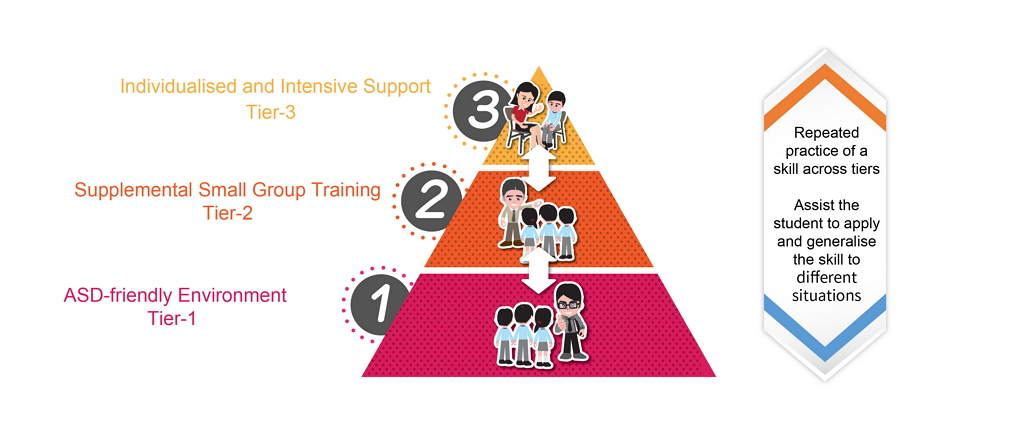Support Measures
Project on “Whole School Approach to Providing Tiered Support for Students with Autism Spectrum Disorder”
In the 2011/12 school year, the EDB embarked on a phased pilot project to enhance support for students with ASD in mainstream primary and secondary schools, with an aim to develop a locally relevant and effective three-tiered model for the Whole School Approach to Providing Tiered Support for Students with ASD (The Tiered Autism Intervention Model or the AIM Model). This model uses evidence-based strategies to help students develop adaptive skills in learning, social interaction and emotion management, thereby facilitating their effective engagement in classroom learning and integration into the community. The impressive outcomes of the pilot project led to its regularisation starting from the 2020/21 school year.
Under the AIM Model, schools arrange three tiers of evidence-driven and targeting strategies to support students with autism spectrum disorder (ASD), including optimising the learning and teaching in the regular classroom to create an ASD-friendly environment in Tier-1, viz using visual strategies and schedules, systematic rules and regulations, clear demands, simple and explicit instructions, etc. This enables students with ASD to understand and effectively participate in classroom activities. For Tier-2 support, schools provide supplemental small group training for the needy students to enhance their social communication, emotional and learning adaptation skills and abilities. For students with ASD having significantly more adjustment difficulties, schools develop individual education plans for them with interlinked support from Tier-1 to Tier-3.

To facilitate schools to use the AIM model, The Project on “Whole School Approach to Providing Tiered Support for Students with ASD” supports schools to systematically grasp the model and related strategies to cater students with ASD in the school through two approaches, namely “School-based Multi-disciplinary Professional Support” and “Non- Governmental Organisations and School Collaboration”.
Part 1: School-based Multi-Disciplinary Professional Support
In part one of the project, Support teams comprising educational psychologists and officers of the EDB are formed to provide practice-based coaching for the participating schools, and conduct situated learning for teachers. Through the provision of consultation, case discussion, lesson observation and feedback, workshops and inter-school network sharing, the school personnel are equipped with effective strategies for deploying the AIM Model to cater for the needs of students with ASD.
- AIM Alumni Newsletter (Chinese version only)
Part 2: Non-Governmental Organisation and School Collaboration
I. Small group training on social adaptive skills
In order to strengthen the effectiveness of Tier-2 support, the EDB is committed to adopt ‘JC A-Connect : Autism Support Network Project’ whereby the ‘Non-Governmental Organisation(NGO) and School Collaboration’ has been proven to be effective. The expertise of the NGOs in supporting students with ASD will be utilized to support schools to arrange Tier-2 support in the Tiered ASD Model, i.e. supplemental small group training on social adaptive skills. The professional counselors from NGOs will design and implement the various training elements in accordance with the special needs of the students in the group to enhance their social cognition, interpersonal communication, emotional regulation and learning skills, etc. with a view to facilitating their social and learning adaptation and subsequent smooth integration into school, family and community life.
Meanwhile, through observing and participating in the small group training activities, school personnel can be equipped to employ the effective intervention strategies so as to help the students apply the skills learnt in the small group training to the regular classroom and authentic situation. The efficacy of learning of the students will then be improved. Consultation service is also provided for teachers and parents so as to equip them with the professional knowledge and skills to take care of students with ASD.
- Small Group Training on Social Adaptive Skills Newsletter (Chinese version only)
II. Strength-based Programmes
To support secondary school students with autism spectrum disorder (ASD) who possess unique strengths and interests to unleash their potential, the EDB has launched “Strength-based Programmes” for these students in the 2021/22 school year. Through courses of various domains, namely, science, information technology, art and urban planning, participating students with ASD could develop their knowledge, skills and potential. It also aims to enhance their self-understanding, self-determination and self-directed learning, and promote their exploration of career planning and vocational paths. At the same time, each group of students comes from different secondary schools, allowing them to get to know, communicate, and support like-minded peers naturally during learning activities. This greatly benefits the personal growth, social communication and collaborative skills of students.
The Strength-based programmes adopted a "dual-professional" teaching model, in which a team of tutors with specialized qualifications in the curriculum collaborate with experienced counselors in supporting students with autism. Education psychologists from the Education Bureau also participate in some classes to provide timely support. Additionally, a specially arranged "Achievement Showcase" graduation performance allows students to demonstrate their learning outcomes and strengths, helping them accumulate successful experiences.
- Strength-based Programmes Pamphlet (Chinese version only)
